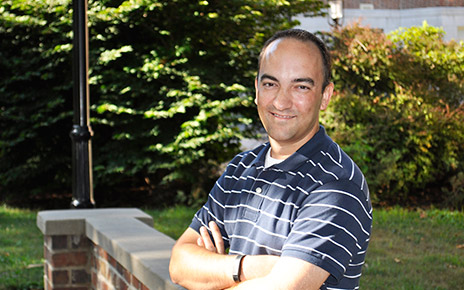Published on March 29, 2016

Eric Aldrich’s interest in meteorology began when he was a child and was frightened by severe thunderstorms. If he could predict when a thunderstorm was going to happen, he thought, then maybe he wouldn’t be afraid.
So began an interest in weather that led to him majoring in meteorology at Mizzou and landed him on KOMU-TV, where he spent 13 years delivering the weather. Most of his time at KOMU was spent on the early morning newscast, which meant setting an alarm for 2:30 a.m.
In June, those early alarms came to an end when Aldrich left KOMU for a position with MU’s Educational Technologies department. He is now a technology resource coordinator working with MU Connect, which is the campus’ online system for supporting student success.
MU Connect allows instructors to communicate concerns or kudos and refer students to resources. The tool also provides an online scheduling feature to set up appointments or group meetings. Aldrich’s role is to help faculty understand the benefits of MU Connect and to serve as a resource for those needing assistance in using the software.
Aldrich’s passion for working with students led him to this role. For the past 10 years, he has taught meteorology in the College of Agriculture, Food and Natural Resources. He is intrigued about the opportunity to further impact student success.
In his teaching, Aldrich became familiar with MU Connect, but had just begun using the new tool last spring and often searched for guidance on how to use it.
“I had no idea that five months later I would be the person explaining to others how it works,” he says. “What better way for me to learn the software than to be the one who has to be able to help someone else learn it.”
Aldrich encourages instructors to use MU Connect to reach out to their students.
“There are multiple ways to help students succeed,” Aldrich says. “For faculty, it is important to provide students information on how they can get help, if they need it. When an instructor takes the time to send an email to a student about a concern, I think students appreciate it.”
Being a faculty member himself allows Aldrich to see MU Connect from an instructor’s perspective.
“Because I teach 440 students each semester, I’ll have a good handle on how the software works in large lecture classes,” he says. “I will be able to provide some best practices for instructors to use MU Connect.”
In the 2014-15 academic year, 8,963 total flags or kudos were raised by instructors. There were 99,236 appointments scheduled through MU Connect and 81 percent of undergraduates had at least one appointment. Seventy percent of the appointments were initiated by the student.
“We’ve seen MU Connect really take off,” says Tina Balser, coordinator of the Student Success Initiative. “Faculty are seeing the benefits the tool provides and they understand that this can help students succeed. Having Eric on board will allow us to better serve our faculty in making this tool most effective.”
Although his forecasts are no longer broadcast across the airways, there is not a day that goes by without Aldrich determining for himself whether he should grab his umbrella. “My family and friends still ask me all the time what the weather is going to be like,” he says.
But now, rain or shine, Aldrich’s primary focus each day is on helping students succeed at Mizzou.